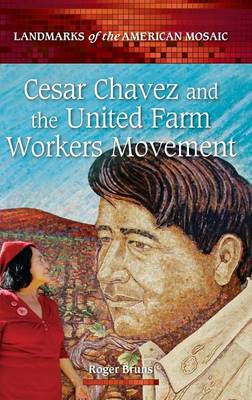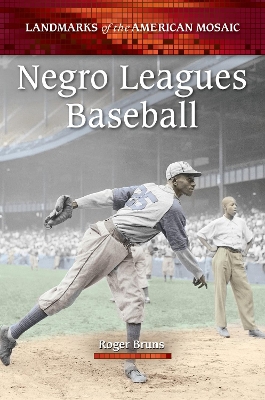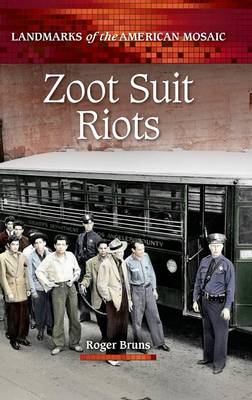Landmarks of the American Mosaic
3 total works
This book offers an illuminating story of how social and political change can sometimes result from the vision, leadership, and commitment of a few dedicated individuals determined not to fail.
Cesar Chavez and the United Farm Workers Movement chronicles the drive for a union of one of American society's most exploited groups. It is a story of courage and determination, set against the backdrop of the 1960s, a time of assassinations, war protests, civil rights battles, and reform efforts for poor and minority citizens.
American farm workers were men and women on labor's last rung, living in desperate and inhumane conditions, poisoned by pesticides, and making a pittance for back-breaking work. The book shows how these migrant workers found a champion in Chavez and the United Farm Workers Union. With the help of quotes from documentary material only recently made available, it tells the story of the boycotts, marches, and strikes-including hunger strikes-used to force concessions for better conditions and pay. It also shows how the farm workers movement helped set the stage for growing Latino cultural awareness and political power.
- Interviews, speeches, congressional testimony, diary entries, and firsthand recollections from the early 1960s to the present
- Profiles of men and women who played important leadership roles in the farm workers movement
This book traces the entire story of black baseball, documenting the growth of the Negro Leagues at a time when segregation dictated that the major leagues were strictly white, and explaining how the drive to integrate the sport was a pivotal part of the American civil rights movement.
Part of Greenwood's Landmarks of the American Mosaic series, this work is a one-stop introduction to the subject of Negro League baseball that spotlights the achievements and experiences of black ball players during the time of segregation-ones that must not be allowed to fade into obscurity. Telling far more than a story about sports that includes engaging tales of star athletes like "Satchel" Paige and "Cool Papa" Bell, Negro Leagues Baseball documents an essential chapter of American history rooted in the fight for civil rights and human dignity and the battle against racism and bigotry.
The book comprises an introduction, chronology, and narrative chapters, as well as biographical profiles, primary documents, a glossary, a bibliography, and an index. The recounting of individual stories and historical events will fascinate general readers, while rarely used documentary material places the subject of Negro League baseball in relation to civil rights issues, making the book invaluable to students of American social history and culture.
- A historical timeline of events
- Biographical profiles of important figures in Negro Leagues baseball
The Zoot Suit Riots in 1943 and the infamous Sleepy Lagoon murder trial of the preceding year represent a turning point in the cultural identity and historical experience of Mexican Americans in the United States. This engaging study of these regrettable events provides context for understanding the continuing battles in the 21st century over immigration policy and race relations.
Although the "zoot suit" had earlier been a black youth fashion trend identified with jazz culture, by the 1940s, the zoot suit was adopted by Mexican American teenagers in wartime Los Angeles, who wore it as their unofficial "uniform" as an act of rebellion and to establish their cultural identity. For a week in June of 1943, the Zoot Suit Riots, instigated by Anglo-American servicemen and condoned by the Los Angeles police, terrorized the Mexican American community. The events were an ugly testament to the climate of racial tension and resentment in Los Angeles-and after similar riots began across the nation, it became apparent how endemic the problem was. This book traces these important historic events and their subsequent cultural and political influences on the Mexican American experience, especially the activist and reform efforts designed to prevent similar future injustices.
General readers will gain an understanding of the challenges facing the Mexican American community in wartime Los Angeles, grasp the racial and cultural resistance of the larger Anglo-American society of the time, and see how the blatant injustices of the Sleepy Lagoon trial and the Zoot Suit Riots served to galvanize Latinos and others to fight back. Those conducting in-depth research will appreciate having access to original materials sourced from Federal and state archives as well as newspapers and other repositories of information provided in the book.
- Connects the racially and socioeconomically motivated events of the World War II-era 1940s to the Chicano movement of the 1970s and the current battles over immigration legislation, allowing readers to see the recurring theme in American history
- Exposes the distortions of a yellow journalistic press in its coverage and treatment of the Sleepy Lagoon trial and Zoot Suit Riots, providing documentation of how white America's perception of Mexican Americans has been fashioned over many years by the mainstream media
- Documents how the zoot-suit and Pachuco cultures of Mexican American youths of the 1940s-an expression of their identity and an attempt to establish their place in the larger American culture-were a key reason behind the violent culture clashes
- Includes previously unpublished primary documents from the National Archives and Records Administration and the Franklin Roosevelt Library


